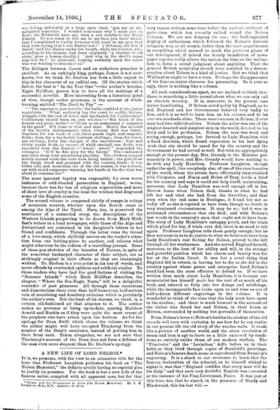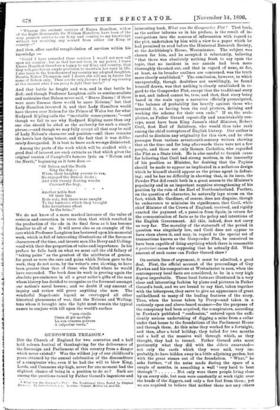A NEW LIFE OF LORD NELSON.*
IT is, we presume, with the view to an attractive title for the hour that Professor Laughton publishes his book as "The Nelson Memorial," the definite article having no especial plea to justify its presence. For the book is but a new Life of the famous sailor, compiled with all apparent care, but for that
• Nelson and his Compsnions in Arms (Ma Meson Menoriat). By J. K Lsn,ghcon, LA., RN. London: G. Alen
very reason written some time before the curious outburst of patriotism which has recently rallied round the Nelson Column. We are not denying its use ; the half-regulated display of enthusiasm which followed the Kaiser's historic telegram was, at all events, better than the tacit acquiescence in everything which seemed to mark the previous phase of our development, if indeed the hourly inundation of news- paper reports really allows the nation the time or the inclina- tion to form a sound judgment about anything. That the general British perplexity should have resulted in a demon- stration about Nelson is a kind of justice. But we think that Wellington ought to have a turn. Perhaps the disappearance of his famous statue obscures his personality. Be it ever so ugly, there is nothing like a column.
All such considerations apart, we are inclined to think that there is something a little unreal about what we can only call an obsolete worship. It is, moreover, in the present case rather humiliating. If Nelson acted nobly by England, as he did, England and her Government behaved very badly to him, and it is as well to leave him on his column and to let our own misdeeds alone. There were two men in Nelson, if ever man had two individualities. Nelson the sailor was one of the singlest-hearted and simplest men in the world, devoted to his duty and to his profession. Nelson the man was weak and erring enough, perhaps, but devoted to Lady Hamilton with a fixed devotion, which found expression in his last dying wish that she should be cared for by the country and the Government he had served so well. But with us, appropriately enough at the present day, Mrs. Grundy is the Minister per- manently in power, and Mrs. Grundy would have nothing to do with any Lady Hamilton. Professor Laughton, though under the spell, like everybody else, of one of the rare beauties of the world, whom the artists have effectually immortalised with Cleopatra and Ninon and Helen of Troy, holds a brief for the country and says it could not help itself, maintaining, moreover, that Lady Hamilton was well enough off in her Merton home when Nelson died, thanks to what he had left her and what she had from the Grevilles; and that even when the end came in Boulogne, it found her not so badly off as she is reputed to have been, though no doubt in very straitened circumstances. It may be so ; but it was in straitened circumstances that she died; and with Nelson's last words in the country's ears, that ought not to have been. The story of Lady Hamilton's unhappy youth, and the trials which plead for her, if trials ever did, there is no need to tell again. Professor Laughton tells them gently enough; but he does not seem to us to do justice to what we believe to have been Lady Hamilton's real feeling for Nelson, proved to the hilt through all her weaknesses. And she served England herself, moreover, to the best of her ability and will, in the strange and powerful position which her charm and beauty won for her at the Italian Court. It was but a cruel thing that England did in return, in leaving her to die as she did in the country against whose power and enterprise Lord Nelson's hand had been the most effective to defend us. If we have written thus much about Lady Hamilton, it is because our memorialist has himself made her the text of so much of his book, and entered so fully into her doings and miedoings, while the incomparable face looks upon us and wins us out of half-a-dozen different engravings in the volume. It is wonderful to think of the time that the lady must have spent in the studios ; and there is much humour in the account of the visitor who found her and Nelson, in their house at Merton, surrounded by nothing but portraits of themselves.
From Nelson's loves to Nelson's battles the student of the old records will turn with curiosity, to see how far he can realise in our present life the old story of the wooden walls. It reads like a picture of another world, and the stern revolution of steam and iron is apt to leave us a little unmoved by condi- tions so entirely unlike those of our modern warfare. The Temeraire ' and the ' Leviathan ' defile before us in their habit as they lived through copies of Stanfield's paintings, and Nelson's famous death-scene is reproduced from Bromley's engraving. It is a shock to our reverence to learn that the famous declaration of the Admiral, as he himself wished to signal it, was that "England confides that every man will do his duty," and that such very doubtful English was corrected at the instance of his Flag-Lieutenant, Pasco. It was just at this time, too, that he signed, in the presence of Hardy and Blackwood, this his last will :— .‘ Whereas the eminent services of Emma Hamilton, -widow of the Right Honourable Sir William Hamilton, have been of the very greatest service to our King and country to my knowledge without her receiving any reward from either our King or country—"
And then, after careful recapitulation of services within his knowledge
Could I have rewarded these services I would not now call upon my country ; but as that has not been in my power. I leave Emma Hamilton therefore a legacy to my King and country, that they will give her an ample provision to maintain her rank in life. I also leave to the beneficence of my country my adopted daughter, Horatia Nelson Thompson, and I desire she will use in future the name of Nelson only. These are the only favours I ask of my country at this moment when I am going to fight their battle."
And that battle he fought and won, and in that battle he died ; and though Professor Langhton calls us sentimentalists and maintains that Nelson never said, "Brave Emma ! if there were more Emmas there would be more Nelsons," but that Lady Hamilton invented it, and that Lady Hamilton would have thrown over Nelson for the Prince of Wales but for what Rudyard Kipling calls the "inevitable consequences ; "—and though we fail to see why Rudyard Kipling more than any one else should be cited as the authority for such a simple phrase ;—and though we may f ally accept all that may be said of Lady Nelson's character and position—still there remains the hero's last dying behest, and the fact that it was delibe- rately disregarded. It is best to leave such wrongs disinterred.
Among the parts of the work which will be studied with a good deal of interest are such extracts as that which gives the original version of Campbell's famous lyric on "Nelson and the North," beginning as it here does :—
" Of Nelson and the North Sing the day,—
When, their haughty powers to vex, He engaged the Danish decks ; And with twenty floating wrecks Crowned the fray.
•
Another noble fleet Of their line Rode out; but these were naught To the batteries which they brought Like Leviathans afloat In the brine."
'We do not know of a more marked instance of the value of revision and correction in verse than that which resulted in the production of the ode in its final form as it has become familiar to all of us. It will serve also as an example of the care which Professor Langhton has bestowed upon his memorial work, which is full of interesting illustrations of the foremost characters of the time, and invests men like Berry and Coiling- wood with their due proportion of value and importance. In his preface he falls back on what we must call the old fallacy of "taking pains" as the greatest of the attributes of genius ; for great as were the care and pains which Nelson gave to his work, they do not seem, by the writer's own showing, to have been greater than that of those who failed where he would have succeeded. The book does its work in proving again the absolute pre-eminence in all a great sailor's gifts of the man whom history has decided to recognise as the foremost amongst our nation's naval heroes ; and we doubt if any amount of inquiry and review will prove anything else now. The wonderful Napoleonic legend so overtopped all other historical phenomena of war, that the Nelsons and Welling- tons whom it brought into the light must remain the typical names to conjure with till upon the world's surface
"una simile Orma di pie mortale La sus cruenta polvere A calpestar verra."







































 Previous page
Previous page